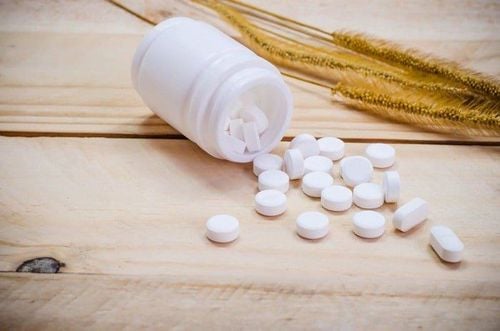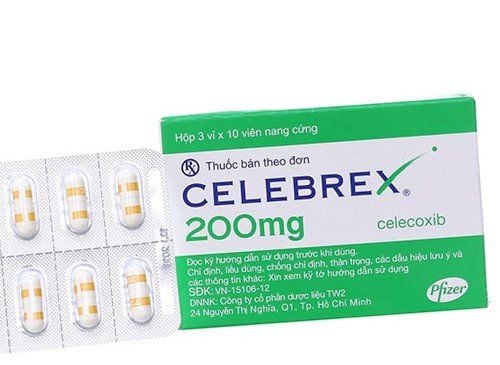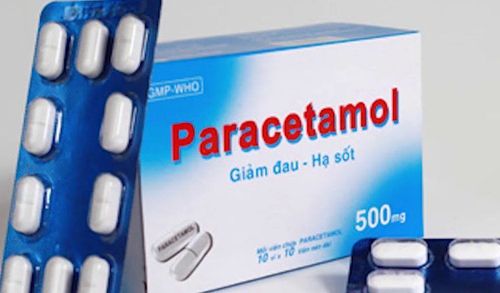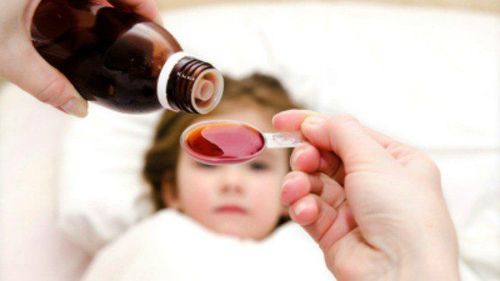This is an automatically translated article.
Tydol is a medicine used to relieve pain and reduce fever, with doses suitable for children. The medicine is made in powdered form and has a flavor that makes it easier for children to take. If used correctly, Tydol will be effective and reduce the risk of side effects. Please refer to the use and use of the drug through the article below.
1. What are the effects of Tydol 150?
Tydol 150 medicine has the main ingredient is Acetaminophen (paracetamol) with a content of 150mg. Prepared in powder form for oral suspension. Paracetamol is a non-steroidal anti-inflammatory drug. Paracetamol (acetaminophen or N - acetyl - p - aminophenol) has the main effect of reducing pain and reducing fever, but paracetamol has no effect on inflammation. Paracetamol with therapeutic doses has little effect on the cardiovascular and respiratory systems, does not cause irritation, does not cause damage or bleeding in the stomach like when taking salicylates, because paracetamol does not affect systemic cyclooxygenase, but only affects cyclooxygenase of the central nervous system. Paracetamol has no effect on platelets or bleeding time. When used, the drug only lowers the temperature in people with fever and has no effect in people with normal body temperature. The drug helps relieve mild to moderate pain that does not originate from visceral organs.
When taken orally Paracetamol is rapidly and almost completely absorbed from the gastrointestinal tract. Peak plasma concentrations are reached within 30 to 60 minutes after oral administration of a therapeutic dose.
2. Indications and contraindications for taking Tydol 150
2.1.Indications Tydol 150 is indicated for use in the following cases:
Antipyretic: Antipyretic in case of fever due to respiratory, oral, viral fever... Pain relief: Pain body due to cold or flu; headache; sore throat ; teethe; immunizations; patients after tonsillectomy; 2.2.Contraindications Tydol 150 should not be used in the following cases:
Patients with a history of hypersensitivity to Acetaminophen. The drug may cross-react with aspirin or other anti-inflammatory analgesics of the same class. Patients with liver failure. Patients with G6PD deficiency, anemia many times, have heart, lung, kidney disease.
3. Dosage and how to use Tydol 150
How to use: Patients need to take the drug orally by mixing the powder with water. To have a more delicious and easy-to-drink suspension, you need to stir the powder into the appropriate amount of water for your baby to drink, and then give it to your baby to drink immediately after mixing.
Dosage: Dosage varies according to the weight of the child.
Children weighing 8-12 kg or 6-24 months old: Take 1 sachet, every 6 hours if necessary and do not use more than 4 sachets/24 hours. Children weighing 13-15 kg or 2-5 years old: Take 1 sachet/time every 4-6 hours/time if needed and not more than 6 sachets/24 hours. Children weighing 16-24kg or children 4-9 years old: Take 2 sachets, every 6 hours if needed, do not take more than 8 sachets/24 hours. Children weighing 25-30 kg or 8-11 years old: Take 2 sachets/time every 4-6 hours/time if needed and do not take more than 12 sachets/24 hours. Note: Do not use Tydol 150 for pain relief for more than 5 days or high fever (39.5oC) for more than 3 days unless directed by a doctor. Patients should visit the doctor to find out the cause so that the best treatment can be given.
Missed dose and overdose:
Overdose: Taking high doses of Paracetamol can cause hepatotoxicity. Overdose can cause nausea or vomiting, abdominal pain, loss of appetite, increased methemoglobinemia leading to cyanosis of the skin, mucous membranes and nails. Children in overdose tend to make methemoglobin more easily than adults after taking paracetamol. If there are signs of drug overdose, the patient should be taken to a medical facility immediately for supportive treatment and detoxification. If N-acetylcysteine is present, give it to the pediatric patient as soon as possible. Missed dose: If you forget to take a dose, you can skip the missed dose and continue taking it at the next time if needed.
4. Side effects of Tydol 150
Tydol 150, if used correctly and without abuse, is quite benign and rarely causes side effects.
Some possible side effects include:
Skin rash and allergic reactions are rare, these include erythema or urticaria , but can rarely be more severe and can May be accompanied by fever due to drugs, mucosal lesions. In rare cases, paracetamol causes neutropenia, thrombocytopenia or pancytopenia. Uncommon nausea and vomiting, headache, insomnia, kidney disease, kidney and liver toxicity may occur with long-term abuse. Rare: May cause hypersensitivity reactions such as anaphylaxis, Stevens-Johnson syndrome (SJS), Lyell's syndrome, toxic epidermal necrolysis (TEN). Patients should immediately seek medical attention if they experience this side effect. Inform the doctor about the unwanted effects that the child encounters when using the medicine.
5. Note when using Tydol 150
Consult a doctor or see a child immediately if the child's symptoms do not improve.
Caution when using Tydol 150 in people with phenylketonuria, anemia.
When taking the drug, you need to carefully review the composition of the drug and do not use it with other drugs containing Acetaminophen.
Children are more likely to experience side effects when taking medicines, so you need to give them the right dose and do not abuse them for a long time.
If used to reduce fever, you should only use it when the fever is above 38.5 degrees Celsius and for children with a history of seizures, it should be lowered from 38 degrees Celsius. Combine physical measures such as warm compresses, wear cool clothes to increase efficiency.
Drug interactions: When taking Tydol 150 may cause interactions with other drugs.
Long-term intake or high doses of Acetaminophen may slightly increase the anticoagulant effect of coumarin and indandion derivatives. Concomitant use of acetaminophen and phenothiazines has the potential to cause severe hypothermia, the risk of dangerous hypothermia. Anticonvulsants (including phenytoin, barbiturates, carbamazepine) or isoniazid may increase the toxicity of Acetaminophen on the liver and increased risk of liver failure. Store the medicine in a cool and dry place, out of the reach of children. Users need to check the expiration date of the medicine before giving it to children. Do not use if expired and showing signs of damage.
Hopefully with the information about the drug you already know how to take the drug and the use of the drug Tydol 150. The correct use of the drug is essential, especially for children at risk of experiencing more side effects.
Follow Vinmec International General Hospital website to get more health, nutrition and beauty information to protect the health of yourself and your loved ones in your family.
Please dial HOTLINE for more information or register for an appointment HERE. Download MyVinmec app to make appointments faster and to manage your bookings easily.













